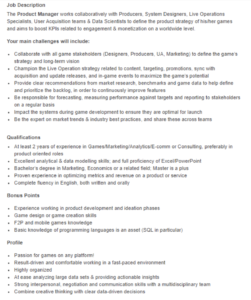Want to turn your passion for video games into a creative career in leadership? Then this article is for you. We’re going to dive in to the gaming industry and show you how to kickstart your career as a Video Game Product Manager.
What Does a Video Game Product Manager Do?
Although the Product Manager role is varied across different industries, the video game industry really does stand out from the crowd. It goes without saying that across the past thirty years, video games have evolved. Therefore, so has the industry and the Product Manager role. Ten years ago, gaming was very much limited to a console, with a limited number of big names within the industry such as Playstation, but there are so many ways in which we now play games.
How Has the Gaming Industry Changed?
The biggest of these changes include the Free to Play (and Pay) model which has removed the price barrier for many gamers. Now, video game consumers have different titles at the tips of their fingers on their mobile phones. The best example of this was the craze surrounding Candy Crush — the game was free to download, but extra features would be options and would cost the player a small fee.
Other significant changes include the ‘always online’ nature of play as well as the popularity surrounding streaming plays on YouTube. Gamers can create a career for themselves simply by sharing their experience online.
So how does this affect the role of the video game PM? The always online nature means that Product Managers need to sort and analyze data that is constantly coming through: you can’t improve your customer experience if you’re not up to date on the data surrounding that experience. Also, since most people now own a smartphone, mobile games offer Product Managers a different kind of role in the gaming industry. This will be discussed further in the next section.
Video Game Product Management Responsibilities
For a Video Game Product Manager, a key part of the role is defining strategy. Owning and tracking KPIs and working with key stakeholders — such as the game development team — are crucial to achieving product success. Aside from this, the key responsibilities tied in the role are dependent on the stage of development that the game is in. If it is early on during the development life-cycle, the focus is on defining a strategy. On the other hand, if the game is nearing its launch, the Product Manager looks at game data and how this will shape future priorities.
Overall, there are four main responsibilities that the role comprises:
- Setting targets: by establishing goals, the team can maximize its output. The best way of doing so is using the SMART analysis. This gives guidelines on how to merge day-to-day outputs to suit your longer term goals.
- Find and analyze issues: sort through data to find any issues and work with the product team to fix and improve them. For the user, a bug is quite simple. It’s something that gets in the way of your play and can be incredibly irritating. Product Managers have to sort through bugs and resolve them, prioritizing them based on urgency and time. Fixing bugs and improving game play are vital and time-sensitive, because the Product Manager is responsible for user experience: you want the game to run as smoothly as possible.
- Communicate with stakeholders: Video Game Product Managers act as the middleman between the product team and the outside world, whether this be the customers or the shareholders. They have to work cross-functionally with internal stakeholders, managing the marketing and sales efforts alongside design and development.
- Provide benchmarks: setting KPIs provides the product team with examples of possible improvements, as well as keeping track of competitors and their actions. Unlike a more general Product Manager role, video game product management dedicates this responsibility not to sales but to the turnaround of developing games and how quickly bugs and glitches are fixed.
As a gaming Product Manager, you’ll be working in an industry where the balance between creativity and development of a game is physically and economically possible. Saying no to creatives will be a significant part of your job. You’ll want to portray a story within your game, but prioritizing the fundamentals is also essential to outdoing competitors and have users choose your game.
How Career Coaching Can Help You Become a Video Game Product Manager
At Product Gym, our career coaches apply a simple four-step framework to land our members the Product Manager job they’re looking for. With this structure and the support of the PG community, both aspiring and veteran PMs have increased the number of calls they receive for interviews. The process also leads to more interviews converted into offers.
Here’s how the magic works:
1. Optimize
From the best techniques for writing a cover letter to building an attractive Product Manager resume, the first step our coaches focus on boosting your credibility and professional branding. We’ll help you optimize your application with:
- A resume designed to beat the ATS
- A cover letter that shows your culture fit
- An optimized LinkedIn profile that aligns with the above
- A 30-second personal pitch that sells you as the best possible candidate
At Product Gym, we provide branding workshops, resume reviews, and the tools you need to take your professional branding to the next level.
2. Apply
Product Gym members apply for 20+ Product Manager jobs weekly, and often average 9+ interviews in any given week. By perfecting your application strategy and interview approach through practice and experience, you’ll build the confidence and expertise you need to wow the recruiter and interviewers at your dream company when the time comes.
Of course, our tried and tested application framework is paired with tools, tips, and interview support that all come together to form a job-hunting strategy that really works. And our coaches are with you every step of the way.
3. Convert
Once you’ve lined up your interviews, it’s time to zero in on converting those round ones into round twos, and so on, all the way to the Video Game Product Manager job offer. It’s no secret that our coaches focus on the Product Manager interview process here at Product Gym: we’re there to help our members learn how to ace every step and every question — including behavioral questions, technical questions, case studies, salary negotiation, and more.
4. Learn
When should you start building your product management skillset? Before you apply? When you’re on the job? Honestly, transitioning into product management can be a long journey. We encourage Product Managers (whether you’re a first-timer or an industry vet) to start learning at the beginning and continue on past the finish line.
You likely already have skills that translate well into a Product Manager role: keep sharpening them, and find the gaps where you can learn, grow, and practice new skills to become a better Product Manager every day.
We want to make sure our members show up skilled and prepared for their interviews and their first day on the job, which is why we offer 20+ technical and business courses taught by industry experts
Mobile Games vs Video Games
What’s the difference between being the Product Manager role in mobile games vs video games?
There are some similarities. For both video games and mobile games, the Product Manager is responsible for:
- Setting short and long-term plans and objectives
- The fixing and improving of bugs and glitches
- Acting the middleman between both internal and external stakeholders
- Being a leader and having the ability to conduct a team.
However, because of the different styles of game play between video and mobile games, along with the difference in target audience, the Product Manager role changes:
- The short life cycle of Mobile and Free to Play games means that a Product Manager for mobile games has to constantly churn out new concepts, improvements, and games. It’s a much more fast-paced environment than the traditional video games.
- A video game Prouct Manager dedicates more time to game-development elements, such as characters and storylines. Unlike mobile gaming, some compare the Video Game Product Manager role similar to that of a Producer.
- A Mobile Game Product Manager’s responsibilities link more to running a tight ship — ensuring everything is on track and making the hardest decisions.
In an XBox Addict interview, Matt Denomme, Senior Product Manager of TERA, explains that the main focus of his role lies in developing the individual features of the game. This includes the scenes, characters, and even certain power moves that can be struck with a sword. The original Video Game Product Manager really has to consider all the finer details.
Video Game Product Manager Job Description
Here’s an example of what the job posting for a Video Game Product Manager role looks like:

What Skills Do You Need to Be a Video Game Product Manager?
- 2+ years of experience in gaming, marketing or consulting: although many Video Game Product Manager postings don’t ask for industry-specific experience, many still ask for past experience in related fields. This is great if video games wheren’t your specialty at school or in your previous jobs. If you’re seeking a lateral move into the gaming industry, a background in a related field gives you a bit of a headstart.
- A related education degree: while not essential, it is great to have a degree in engineering, technology, or game design. However, gaming Product Managers come from a variety of different educational backgrounds, such as business, marketing, or economics. You’d be surprised at how your experience can translate to a product management role.
- A real passion for games: This one is a must-have. There is very little point going for this kind of position if you don’t really care for the industry. Video and mobile games are a creative industry, and only passion and interest will make you successful.
- Being an advocate for the user of your game: This comprises the collection, analysis, and interpretation of data after research on UX has been conducted. Your research provides an understanding of your user. This will enable the analysis of viewer engagement metrics, which can be used to increase user engagement, retention, loyalty, etc.
- Effective communication and interpersonal skills: Communication skills are essential in any leaderhsip role, and are imprtant to product management as a whole, regardless of industry. As a Video Game Product Manager, you need to interact with and motivate your product team, as well as keep external stakeholders in the loop.
Other common skills include the ability to produce and develop roadmaps, being incredibly organized, and having a basic understanding of programming language. For example, in this Video Game PM posting at Playstation, the most valued skill is being able to lead and act as the go-between for the product team and the player. It’s an all encompassing role that has to take business, legal, marketing, and other teams into account, all while keeping the consumer at the forefront.
What Is the Average Salary for a Video Game Product Manager?
There are three main variables that will affect the salary that you will receive as a gaming Product Manager:
- Where you are in the world: In the US, the average salary tends to be $75,914, whereas in the UK the average salary equals £52,638.
- Where you are on the career ladder: Entry-level Product Managers tend to earn around $54K, whereas Product Managers with more experience under their belt earn closer to $196K.
- What organization you’re working for: If you’re working for a lesser-known or start-up, you’re less likely to receive a large salary, whereas if you’re working for a huge organization such as Nintendo, you’re sitting on an average of $161,000.
How to Become a Gaming Product Manager
Do Your Research
It is important that you are in the know when it comes to the state of the industry, as well as the jargon that accompanies it:
- Microtransactions – this is a business model where users are able to buy vital elements for small amounts of money.
- Gamergate – this is when the gaming community started hosting heated discussions around women and ethics within gaming, where many were incredibly derogatory.
- Easter Eggs – these are hidden counterparts that are featured in games.
- Alpha and Beta – these are the first and second phases of testing for video games and tend to happen in-house.
- Noob – a new and non-experience player.
Revamp Your Resume
To start a career in the gaming industry, you have to be passionate about creating and developing games. Your resume should reflect this. You will need to provide examples of working on a project with a real-life team. If you have a degree in video game design (not a requirement) make sure you highlight this as it can really help with setting you apart from the crowd. Finally, search for the specific qualities and skill sets you are looking for and insert these across your resume.
Optimize Your LinkedIn
This is a prerequisite for any Product Manager, especially with many companies now using headhunting techniques instead of traditional job advertising. Ensure that you have your LinkedIn optimized with relevant experience and the skills you’ve obtained. You should look to position as much of your work history and skills as possible for product management, even if Product Manager was not your official title. If you are able to get other LinkedIn users to endorse these skills to have an even better chance at attracting a recruiter.
Apply and Prepare Your Personal Pitch
Your application includes all your branding materials. You should have a perfect resume for Product Manager, optimized LinkedIn profile, and a cover letter that exhibits your personality all ready to go before you hit send on the application. Your branding materials should also include a killer pitch. This is your personal elevator pitch: it should outline your background in the best possible way to lean into the Product Manager position’s key responsibilities.
Network with Recruiters and Hiring Managers
Did you know that submitting your resume is only one way of winning that interview? If you already have som experience as a Product Manager and want to make a lateral move into the gaming industry, you can network your way in. By connecting with Recruiters and Hiring Managers, you’re familiarizing yourself with the employee culture, work environment, and gaining information regarding your recruiter. In addition, you’re learning the ins and the outs of the interview exercise, which gives you the leverage you need when it comes to being called for an interview. Don’t know where to start? Check out this video guide:
Practice for Common Interview Questions
This is the crucial final step in landing a Video Game Product Manager role: you need to put in the work when it comes to interview preparation. The internet is your best friend here. You can research the general common questions across the industry, but, make sure to check reddit feeds about the specific companies and the questions they tend to ask — also take a look at their company website to see if they give any tips.
So, that’s it! Hopefully, this has answered all of your questions surrounding how to get a product management role in the video game industry. With the right strategy, you’ll be getting that job in no time. In the meantime, if you have any questions or want to chat with someone abptu your career goals IRL, schedule a call with one of our career coaches. We’d love to hear from you.



